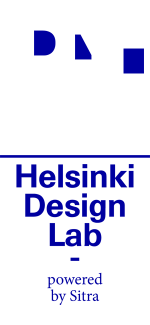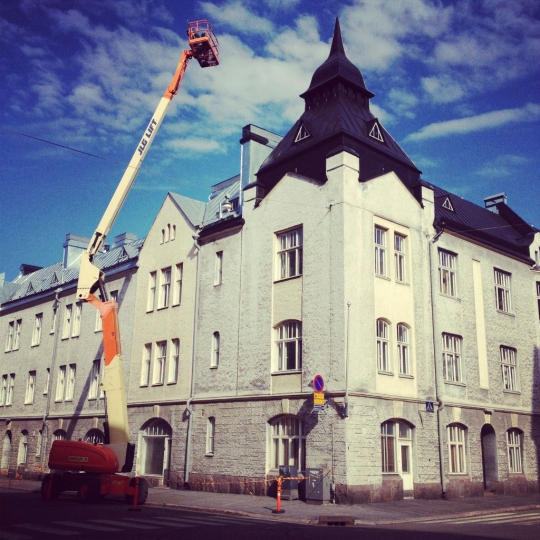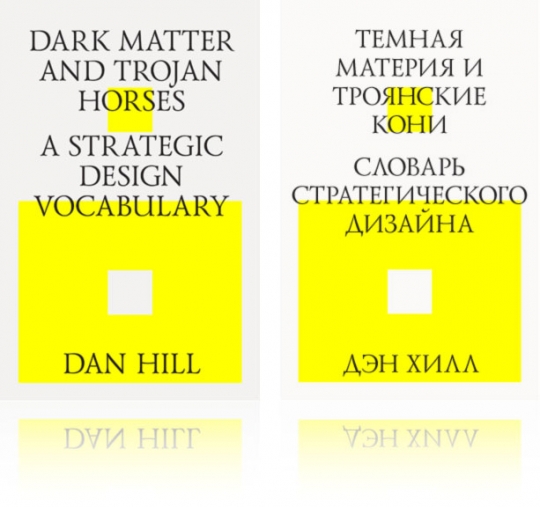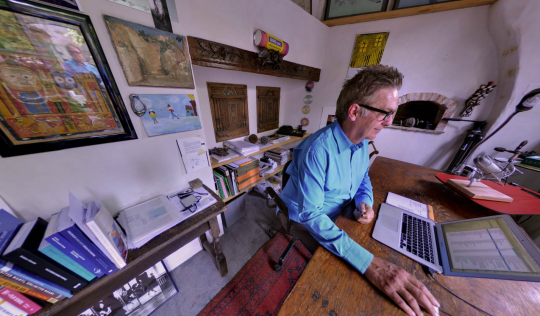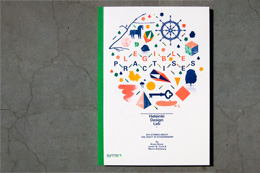And another two-for-one, which illustrates a) that we're busy, which is good, and b) that for many of us, holidays are approaching rapidly, like a broad sweep of clear blue sky appearing on the horizon, which is also good.
Summer is here, by the way.
After giving a talk at the European Centre for Living Technology in Venice, Bryan then took the opportunity of being in Italy for a quick well-earned break featuring la dolce vita, I believe. ECLT seem to be doing some really interesting work regarding "economically viable"/sustainable mountain communities in Italy—definitely worth a look, according to Bryan. Meanwhile, Marco and Justin have been knee-deep in Low2No as usual, partly working on this aspect, amongst other things. And Maija Oksanen has joined us too, as a summer intern. With Kalle, we now have a fuller team, and thankfully some more native Finnish speakers. That is already helping us hugely, though Maija and Kalle bring a lot more than just their exemplary language skills.
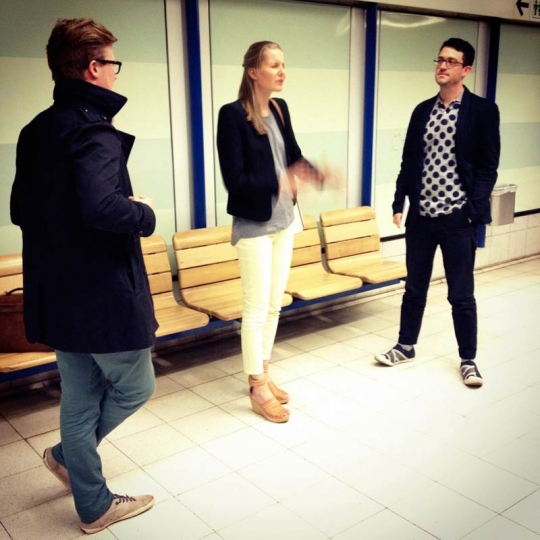
Part of team SDU, now featuring interns.
In the last few weeks I've been to Milan, London, and Amsterdam. Oh and I had to unfortunately cancel a trip to Moscow, which is probably just as well given that diary. (But still, Russian visa timelines! Why, in this day and age, is it still so difficult for non-Russians to do business in Russia? Legacy dark matter.) I'm sorry not to have made it to Moscow, but these trips are always a whirl of talks, lectures, meetings, logistics, and brief, stolen moments of peace and reflection amidst the bustle of these fine, old cities.
The Russia trip was to be a talk at Strelka Institute, which I'm hoping to be able to do later in the (northern) summer. Strelka are one of the more interesting design schools in Europe at the moment. They also happen to have recently released the essay I wrote about six months ago (Bryan referred to it last time): "Trojan Horses & Dark Matter: A Strategic Design Vocabulary."
This is part of the new Strelka Press series, curated by Justin McGuirk, which features other essays by the likes of Owen Hatherley, Sam Jacob, Keller Easterling, Julia Lovell and Alexandra Lange, as well as Justin himself. It's an interesting approach, exploring the e-book format for essay-length writing, and priced at a level that makes it accessible to a wide audience.
My essay covers a lot of the terms, and background conversations and thinking, that underpin some of the things we've been writing about — and more importantly, trying to get done. It's intended to be a kind of primer, or "playbook", which presents the idea of a vocabulary - as a way of starting and developing conversations in this new area. With that in mind, please do let me/us know what you think.
The other trips were to the Politecnico di Milano's architecture summer school for a talk, but with a short hop over to Frog Design Milano to discuss strategic design with them. Also, Joseph Grima of Domus magazine, to talk Istanbul Design Biennale amongst other things.
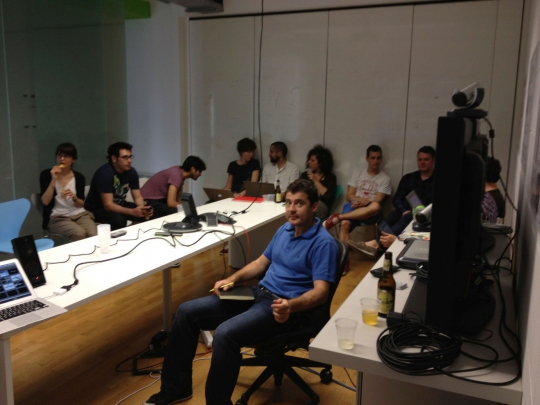
Milano Frogs, about to get a talking to.
London was more of a meeting-based trip, featuring a catch-up with the indefatigable Tom Loosemore, an old colleague from BBC days, who is now doing great things at Government Digital Services, which is part of the UK Cabinet Office (we mentioned their design principles previously). They, too, are going well beyond "this is just a website" work. Also, a useful catch-up with Philip Colligan and Laura Bunt at our sister organisation NESTA RE Helsinki Design Lab 2012, and a good chat with Laura afterwards. Plus a meeting with Gill Ereaut of Linguistic Landscapes, who do fascinating work working with organisations (often public sector) to understand and unpick their habitual behaviours through the prism of their everyday working language.
I also met up with Ricky Burdett of the London School of Economics 'Cities' programme. Burdett is a hugely influential figure in the field of urbanism and cities generally, so it was a pleasure and privilege to meet him. It looks like we'll be working together on a new LSE Cities conference in London at the end of the year, where I'll be talking Brickstarter and beyond, hopefully, in the context of "smart" and "not so smart" cities.
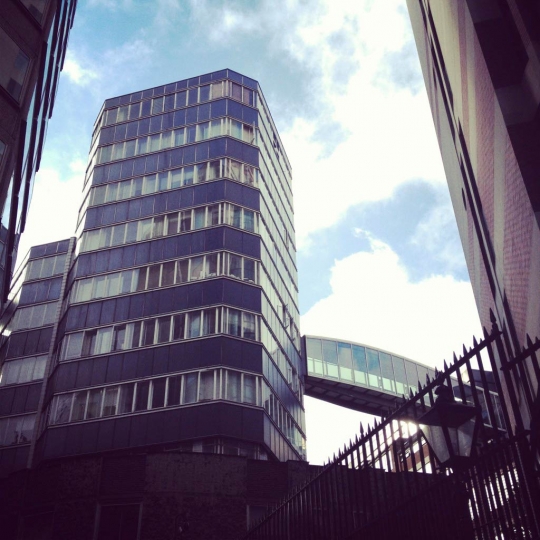
Visiting the London School of Economics
Ricky and I are also on the advisory board - with Sir Peter Hall and Saskia Sassen - for a new Young Foundation project called "The Social Life of Cities", in association with Cisco. We had a first meeting of that last week, for which I had to endure a visit to a terrible business park in Espoo. The irony of being there - virtually alone, surrounded by concrete flyovers and lazy, ugly, damaging buildings - and yet talking about "the social life of cities" was not lost on me. Perhaps it's useful research just to be there! Still, the project could be very valuable and we got off to a good start with an engaging discussion.
Back in London, I spent a long but enjoyable day at BERG London, judging the Core77 Interaction Design awards, with Bonnier's Sara Öhrvall, BBC's Julia Whitney and BERG principals Matt Jones, Jack Schulze and Matt Webb. Results out in July.
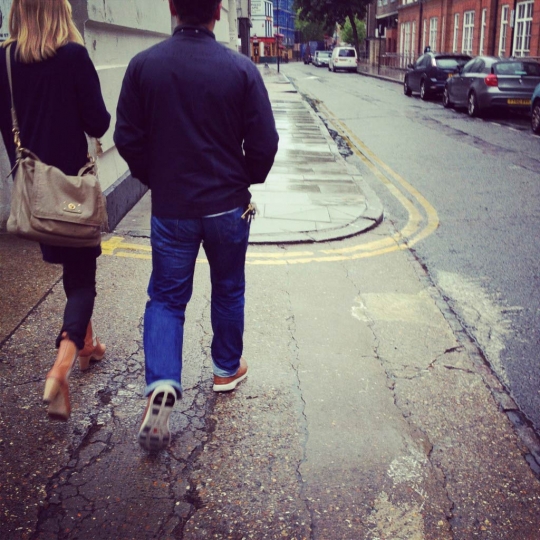
Sara Öhrvall & Matt Jones, breaking for lunch.
While at BERG's studio, Sara and I were addressed by a certain Little Printer.
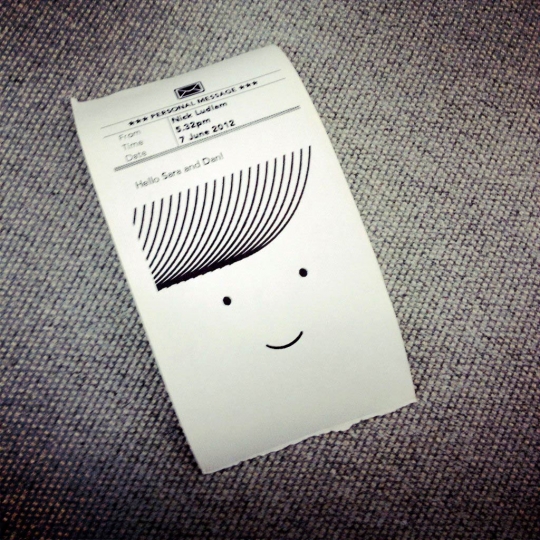
Little Printer's little print-out.
Finally, Amsterdam was a speech at the start of the 'kennisdag' (knowledge day) for the 500 staff of the City of Amsterdam's "spatial sector" (architects, planners, engineers, real estate etc.) The City had lined up a very impressive day of workshops for their staff, all held at the wonderful Felix Meritus building on beautiful Keizergracht. It was great to see a city government actively working at shared thinking and discussion, particularly given the challenges all city governments are beginning to face (and so the Brickstarter work was again germane to their thinking.)
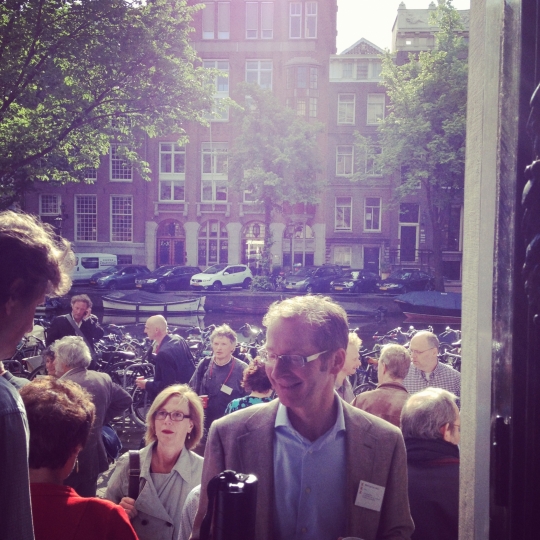
City of Amsterdam folk, arriving for the "kennisdag".
For Brickstarter, we brought energy policy expert Robert Brückmann (of Eclarion) over from Berlin, to talk to Sitra and a few other representatives from relevant sectors in Finland. We had a great discussion about Germany's energiewunder - also discussed previously here. Again, we are hugely inspirted by what Germany have done here. This follows previous Brickstarter talks from Marcus Westbury and Rodrigo Araya, and more to follow after the summer break.
We'll have some major updates on Brickstarter.org shortly. I've been handling the stewarding of a clickable prototype "conversation starter", and that will soon be up. Maija has been plugging away researching 'adjacent' services. Expect to see lots of little 'fact card'-like blog posts up there soon. Kalle has also been developing some similar 'fact cards' around food scenes in cities - focusing on the legislative environment (dark matter), rather than cuisine as such - for use in our food-related projects. (Just after that, Kalle, who is a barista, headed off to Vienna for the World Cup Tasters Championships, where he placed ninth. Amazing. Well done Kalle!)
That food work is progressing rapidly now, in partnership with Antto Melasniemi & Elina Forss, as well as the City of Helsinki (Ville Relander) and will soon be appearing on its own project blog.
We'll also give you an update regarding our Design Exchange project shortly, which has been progressing nicely in Lahti, as well as our renovations and reworkings of the Sitra tower.
Meanwhile, it seems that every other week we're discussing what we do with representatives of various pioneering Canadian social innovation organisations and foundations - they seem like they are on the brink of becoming the most fertile place for that kind of work, interestingly. A couple of weeks ago, Bryan had a chat with Lisa Tjorman, of the aforementioned excellent Labs report, and last week, we were happy to discuss our work with Allyson Hewitt, also of Social Innovation Generation in Toronto. Watch that space, is all I'll say for now, but they're heading somewhere very interesting over there …
And finally, as they say at the end of British news broadcasts, we're spending a lot of time on internal culture, and particularly the notion of "ideas", "projects" and the relationship between those things. Which, of course, is not always self-evident, or simple.
With that in mind, Bryan forwarded on this post from Adam Mathes, formerly a product manager at Google, about his practice:
My conclusion after a few years is that the best product management is about providing the vision of what to build and why and then creating the context where great things can be made. That context usually involves the right people, space, time, and patience...
But for truly innovative and creative products, project management may not matter as much. If you are making something new and creative and different, it’s hard to know exactly how to make it. You may be building the tools and technology you need because they don’t exist yet. And may be impossible to properly estimate how long it will all take.
More on Adam's blog.
And finally and finally, we spied our "In Studio" book on John Thackara's bookshelf in the lovely "virtual tour" of his workspace recently posted. It's apparently creeping its way towards him, day by day. As it should you.
